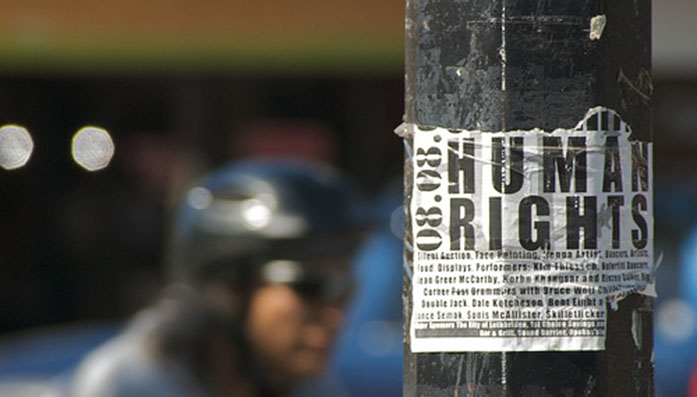Economic equality requires more than human rights — says one expert in law and history.
Samuel Moyn, a professor of law and history at Harvard University, gave a lecture in Iowa City on Thursday titled “Why is the Age of Human Rights the Age of Inequality?” in Schaeffer Hall.
He spoke about the human-rights movement as a popular political language, and the connection that it has with the explosion of economic inequality, from a historical view.
Moyn, who received a doctorate in modern European history from the University of California-Berkeley, is also the author of two popular human-rights books: The Last Utopia: Human Rights in History and Human Rights and the Uses of History.
“The main argument is that human rights — the universal declaration of human rights — are not egalitarian movements, they’re not aiming to achieve social justice in general,” he said. “They’re aiming at something less ambitious, but still important, to prevent torture or protect free speech.”
The egalitarian belief is the principle that all people are equal and deserve equal rights and opportunities.
However, Moyn said an individual could become an egalitarian and not believe in absolute equality, which would be similar to communism.
He said the human-rights movement does not solve the economic inequality issue that currently exist in the world as evident by the rise of the wealthy and the stagnation of the medium to poor income groups in the past 50 years.
“The human-rights movement is not the right movement to address this problem if you think it is one,” he said.
Moyn said the right movement to address the issue of inequality is based on the egalitarian philosophy.
“When have human beings ever achieved some kind of egalitarian outcome? And the answer seems to be one time, in modern history,” he said. “And it’s when there was a very powerful working class and a Soviet Union outcry, and what they shared in common was that they scared the wealthy away.”
Moyn said democratic-socialism is the solution, and that redistribution of wealth can both impede and grow an economy.
Amy Wisemann, assistant director at the University of Iowa Human Rights Center, said she believes inequality is a problem that exists in all communities, including Iowa City.
“I think the fight for minimum wage is a good example of a way in which human-rights language needs to be employed to improve and address economic inequality,” she said.
Wisemann said the lecture is an educational opportunity for students and the community.
“This is an opportunity from a scholar who’s speaking about these issues and writing about them in compelling ways,” she said. “We believe these ideas matter in shaping our beliefs and perspectives.”
David Gonzales, a UI first-year law student, said he went to the talk because of his natural interest in human rights.







